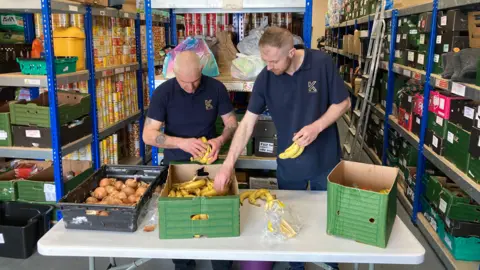In a poignant development highlighting the struggles faced by food banks, King’s Food Bank, situated within King’s Church in Darlington, has announced drastic staff cuts due to insufficient funding. This charitable institution has been a critical support system for many families, providing over 125,000 free meals in the past year alone. However, an alarming increase in demand, exacerbated by the ongoing cost-of-living crisis, has outpaced the resources needed to sustain its operations. As a result, the food bank has had to make the difficult decision to lay off four out of its five staff members.
Michael Coltman, a representative from the church, expressed his deep sadness over the situation. He emphasized that the forced decision to reduce staff was not a result of dwindling demand, but rather a financial necessity. “It’s sad when you’re forced into a decision based on finances, not because the need has dried up,” Coltman stated. This stark reality underscores the challenges faced by many community-based organizations that operate largely on donations and goodwill.
The necessary cuts will lead to a significant scaling back of services at the food bank. Moving forward, provisions will primarily be directed towards individuals identified as most in need. This includes those referred by social services, healthcare providers, or charities, which further highlights the growing urgency for targeted support. Coltman remarked, “We’ve had to make changes to the service we provide to people in need, based on finances and because we don’t have the provision to do it.”
Caroline Todd, the manager at King’s Food Bank, shared her insights about the emotional toll of the situation. She recounted the stories of people who come to access the food bank; many arrive with visible distress and reluctance, often reflecting a sense of pride that makes seeking help particularly heart-wrenching. “We see proud people coming here in tears. That’s just what absolutely breaks my heart, that people don’t want to access a food bank. This is their last port of call,” said Todd. Her comments shine a light on the stigma surrounding food banks and the lengths to which families go before seeking assistance.
While the demand for aid grows year after year, many community members continue to struggle with the financial burdens brought on by rising living costs. The situation is a stark reminder that food insecurity is prevalent, affecting even those who are employed. Coltman affirmed the church’s commitment to keeping the food bank operational in some capacity, acknowledging the continuous kindness and generosity from the people of Darlington over the years. “I’d ask if they could continue with their fantastic support as we try to provide for those in the most need,” he urged.
The unfolding story of King’s Food Bank is emblematic of broader societal issues related to food insecurity, particularly exacerbated by economic challenges. As organizations like these grapple with funding shortages while trying to meet the ever-increasing demand for support, it raises important questions about long-term sustainability and adequate support for essential community services.
In light of this pressing situation, it is crucial for community members to rally together to uphold the support systems that have become vital lifelines. News outlets, including BBC Look North, are drawing attention to the plight of food banks, highlighting the need for increased community support and proactive measures to ensure that food insecurity does not overshadow the spirit of compassion and community in places like Darlington.
Support from various channels, whether through donations or advocacy, will be essential as King’s Food Bank and similar organizations navigate these challenging times, striving to continue their critical mission of support for those most in need.



